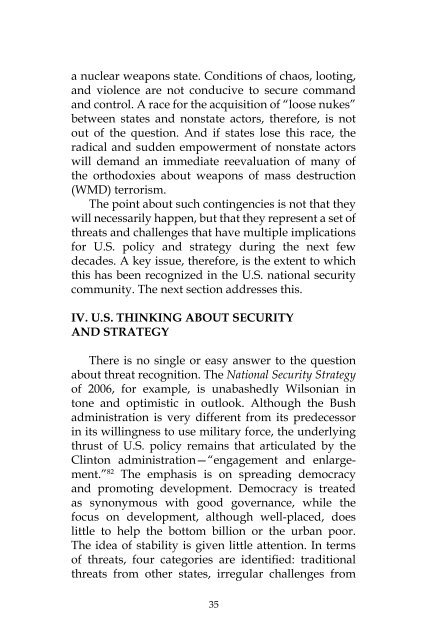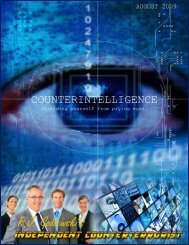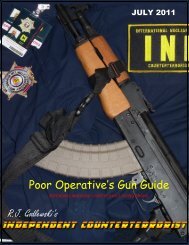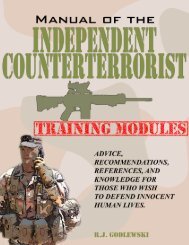R.J. Godlewski's The Independent Counterterrorist. I, Militia. June ...
R.J. Godlewski's The Independent Counterterrorist. I, Militia. June ...
R.J. Godlewski's The Independent Counterterrorist. I, Militia. June ...
- No tags were found...
You also want an ePaper? Increase the reach of your titles
YUMPU automatically turns print PDFs into web optimized ePapers that Google loves.
a nuclear weapons state. Conditions of chaos, looting,<br />
and violence are not conducive to secure command<br />
and control. A race for the acquisition of “loose nukes”<br />
between states and nonstate actors, therefore, is not<br />
out of the question. And if states lose this race, the<br />
radical and sudden empowerment of nonstate actors<br />
will demand an immediate reevaluation of many of<br />
the orthodoxies about weapons of mass destruction<br />
(WMD) terrorism.<br />
<strong>The</strong> point about such contingencies is not that they<br />
will necessarily happen, but that they represent a set of<br />
threats and challenges that have multiple implications<br />
for U.S. policy and strategy during the next few<br />
decades. A key issue, therefore, is the extent to which<br />
this has been recognized in the U.S. national security<br />
community. <strong>The</strong> next section addresses this.<br />
IV. U.S. THINKING ABOUT SECURITY<br />
AND STRATEGY<br />
<strong>The</strong>re is no single or easy answer to the question<br />
about threat recognition. <strong>The</strong> National Security Strategy<br />
of 2006, for example, is unabashedly Wilsonian in<br />
tone and optimistic in outlook. Although the Bush<br />
administration is very different from its predecessor<br />
in its willingness to use military force, the underlying<br />
thrust of U.S. policy remains that articulated by the<br />
Clinton administration—“engagement and enlargement.”<br />
82 <strong>The</strong> emphasis is on spreading democracy<br />
and promoting development. Democracy is treated<br />
as synonymous with good governance, while the<br />
focus on development, although well-placed, does<br />
little to help the bottom billion or the urban poor.<br />
<strong>The</strong> idea of stability is given little attention. In terms<br />
of threats, four categories are identified: traditional<br />
threats from other states, irregular challenges from<br />
35







